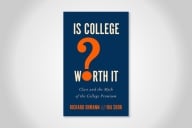You have /5 articles left.
Sign up for a free account or log in.
Academic research confronts a perilous environment. Government funding has been cut. Members of Congress express skepticism of or hostility to entire disciplines, especially political science but also the social sciences generally. Scholarly publishing confronts important challenges. Traditional paywalls are increasingly controversial and, some argue, counterproductive. University presses face financial pressures.
There are no easy solutions to these problems. Nevertheless, we think that a more public-facing academy is a necessary, if insufficient, response. Public engagement helps to demonstrate the value of research. It also helps to generate a larger audience for scholarly research and therefore potentially more revenue for publishers. We are not suggesting that research intended for a broader audience can or should supplant research targeted at the scholarly community. But we think there is room for more scholars to demonstrate that their expertise is important outside their subfield.
We have a new book on the 2012 presidential election, The Gamble, that provides one model for public engagement. The book was designed to be an accessible academic account of the election, written in real time and published within a year of the election itself — standard timing for books focused on the general public, but an unusually short time frame for a scholarly book. Together with our publisher, Princeton University Press, we structured the project so that we could enter into the ongoing public discussion about the election alongside pundits and journalists — via continuous analysis and writing, serializing the process of peer review, and accelerating the final mechanics of publication.
Our experience writing this book suggests to us that there are underutilized opportunities for both scholars and their publishers to innovate on traditional modes of academic writing and thereby bring scholarly research to a much larger audience. We joked over the past two years that part of "the gamble" was simply writing the book itself. We believe that this gamble has paid off, and we offer our story in hopes that it might encourage others to roll the dice. We think this sort of project can benefit scholars, publishers, and the broader public alike.
Why We Wrote the Book
The book was motivated by two goals. The first was simply to tell the story of what promised to be a lively and competitive election. The second goal was to amplify the voice of political science in the conversation about the election—from events on the campaign trail to explanations and interpretations of the election after it was over.
Journalists typically write the history of American presidential elections, a history built on their access to decision-makers in the campaigns. We believed that the social scientific study of campaigns, with its emphasis on systematic data and statistical analyses, adds something important. Whereas journalistic accounts effectively capture why campaign principals made the decisions they did, a political science account can better determine whether those decisions mattered.
The problem, however, is that political scientists — like most academics — usually work too slowly to have much influence. Science takes time, and so the first academic articles might appear about 18 months after an election. Academic books may take two to three years or even longer. By this point it is too late. The conventional wisdom about the election has congealed — whether it is correct or not — and journalists, commentators, and voters are already thinking ahead to the next election. After the 2004 election, for example, the misinterpretation of a single question on the exit poll led some commentators to attribute President George W. Bush’s victory to his appeal among "values voters."
We wanted to be different. We wanted to write an academic book, but with a journalist’s faster metabolism.
How We Wrote the Book
In August 2011, we pitched the book to several different presses. In February 2012, we signed a contract with Princeton University Press. In August 2012, the first two e-chapters of the book were made available for free by Princeton Press. In January 2013, a third e-chapter was released. In April 2013, a fourth and final e-chapter debuted. In September 2013, the print edition of the book will be published — including revised versions of the e-chapters as well as four additional chapters. Looking back at our drafts of the initial and final chapters, we wrote the entire book in about a calendar year. How were we able to do this?
Like Lennon and McCartney, we got by with a little help from our friends. Their help was most evident in the data we were able to obtain at no cost — weekly survey data from the firm YouGov, daily data on media coverage from the firm General Sentiment, data on candidate advertising courtesy of The Washington Post, and multiple other datasets from generous colleagues. These data were necessary to make our book stand apart from other accounts of the campaign. Most importantly, we received these data promptly and continuously, allowing us to do analysis while the campaign was under way.
Second, we wrote about our findings in public forums during the campaign itself. This writing had several benefits. It helped ensure that the book would be completed in time. It allowed us to elicit responses to our argument that, at times, led to revisions and corrections — a sort of crowdsourced peer review. And it put our perspective into the conversation happening in the moment. We found blogs to be the ideal venue for doing this because they allowed us to write and publish with minimal editorial delay and to get feedback in comments threads under each blog post. We contributed to The Monkey Cage, YouGov’s Model Politics, Campaign Stops and FiveThirtyEight at The New York Times, and Wonkblog at The Washington Post.
Finally, and perhaps most important to the successful completion of the book, was the innovative plan devised by Princeton University Press (PUP), which certainly took a gamble as well. Our editor at the project’s inception, Charles Myers, convinced us that the book would be more accessible to a non-academic audience if it had a chronological narrative at its core, rather than the thematic structure that academics often favor. Then, as we completed drafts of individual chapters, PUP sent them out for peer review, rather than waiting until we had finished the entire manuscript. PUP had secured reviewers in advance and requested a tight turnaround. PUP also produced the multiple e-chapters that allowed the book to be partially serialized. In their view, having these e-chapters — and giving them away for free — would help build interest in the book. Over 2,000 copies of these chapters were downloaded from Amazon, in addition to an untold number of PDF copies downloaded from the PUP website or The Monkey Cage. Several colleagues assigned these chapters to their students, circulating them further.
PUP also accelerated the process of producing a print volume — giving us stringent deadlines that we had to meet. We managed to do this with modest success, although we created delays by adding a new chapter at the 11th hour and by fine-turning analyses for weeks on end. But ultimately, we finished the manuscript in time to produce a book that would be published alongside, or even before, the journalistic accounts. PUP deserves credit here as well, as it is taking them only three months to turn that final manuscript into a book available for purchase.
What impressed us throughout this process was the press’s flexibility and willingness to innovate. The press showed how to take the existing model of scholarly publishing — one centered on peer review — and modify that model to produce a book that was still rigorous but also timely and, we hope, lively.
Did “The Gamble” Pay Off?
We believe that it did. We sought to tell the story of this election, and we believe that our account provides a novel perspective that challenges much conventional wisdom. More than a few commentators argued that the underlying economic and political fundamentals were not in Obama’s favor. We show that this was untrue: the economy was growing fast enough for the incumbent to be favored. Many commentators also saw the Republican primary as a search for "anybody but Romney." We show that this was also untrue. The many anybodies — Rick Perry, Herman Cain, Newt Gingrich, Rick Santorum, etc. — surged largely because of temporary increases in media coverage of them, and not because Republican voters had any underlying hostility toward Romney himself.
After the election, commentators were quick to attribute Obama’s victory to his superior campaign. We show that the effects of things like campaign advertising and field organizing were likely not large enough to account for Obama’s victory. We also call into question many prevailing interpretations of the election — that it augured a Democratic realignment, that it suggested a profoundly "Liberal America," that it suggested the Republican Party needed a complete overhaul. On the whole, the 2012 election was very much what extant political science research led us to expect. It showed that a book building on and elaborating that research could make a useful contribution.
We also sought to be part of the conversation among journalists and commentators, and we felt included in that conversation. This was reflected in opportunities and invitations to contribute to media outlets — such as our collaboration with Ezra Klein to develop a forecasting model for Wonkblog. It was reflected in the willingness of high-profile journalists and commentators to endorse the book. It was reflected in ways in which commentators chose to engage with political science in their own writing. Even when they disagreed with us, with other political scientists, or with their conception of what "political scientists say," it was better than being ignored.
Of course, we will have a better sense of whether our book has any particular impact after it is out. But regardless we believe — although it is difficult to measure — that political science ideas and findings are much more in the bloodstream of campaign journalism and punditry than they once were.








